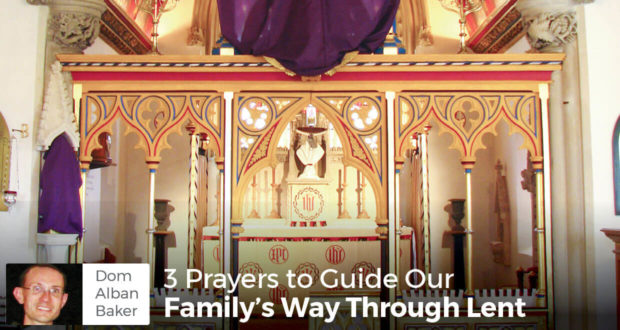Summary
Dom Alban Baker helps our Lenten way with three prayers from the Mass in the first few days of Lent and ways they can be applied to homeschooling families.As Catholics, we know that our faith comes from the two fonts of Scripture and Tradition, and these two find their most complete expression in our public worship, with Scripture forming a large part of the texts and Tradition supplying the prayers and melodies from the early ages of the Church. Hence the liturgy should be a source of our Lenten practices.
This article considers three opening prayers of the Mass (collects) which occur in the first few days of Lent and suggests some ways in which these prayers can be applied to homeschooling families.
1st Sunday of Lent
Grant, almighty God, through the yearly observance of holy Lent, that we may grow in understanding of the riches hidden in Christ and by worthy conduct pursue their effects.
This collect aptly describes what Lent should be about: we seek to better understand the riches hidden in Christ and behave accordingly. The allusion is to St. Paul’s letter to the Colossians, where he writes that “all the treasures of wisdom and knowledge” are hidden in Christ (2:3). The focus might surprise us—isn’t Lent about giving up something, depriving ourselves? Yes, but for the end of closer union with Christ whom we imitate in fasting and self-denial.
This prayer seems written with homeschoolers in mind, for no matter what the subject, Christ is the origin of all the wisdom and knowledge found in that discipline. He is the author of mathematics just as much as He is the author of theology. Since whatever we study is a portion of the truth, and Jesus is Truth, we ultimately wish to grow in understanding of Him.
This is an important fact to keep always in mind: is our objective as a family to grow in wisdom and knowledge, or to get a diploma? Is wisdom our objective or only knowledge? Wisdom, by means of our contemplation of God, helps us set all things in order according to that highest cause: it gives order to our thoughts, words and actions. Are our lives ordered by what we learn or filled only with facts?
A practical way to seek wisdom in Lent is to read the daily Gospel as a family at the beginning of the homeschooling day. The children can take turns reading each day, and as much as each is able, each child can suggest a way in which the Gospel message can be lived out that day. (Dad and Mom should make suggestions on days where the passage is more difficult.)
This practice reinforces that Christ’s teaching is the summit of wisdom and it is the kind of wisdom that enriches our whole lives, not just our minds.
Moreover, the more they hear about Jesus, the more your children will love Him, and that is the goal of each Catholic homeschooling family.
Tuesday of the First Week
Look upon your family, Lord, that through the chastening effects of bodily discipline, our minds may be radiant in your presence with the strength of our yearning for you.
This collect reminds us that Lent is also about bodily discipline: traditionally, fasting. Fasting means that we eat less than we normally do; abstinence is when we do not eat a particular type of food. Both are characteristic of Lent, but fasting is more important, as that is what Christ did during the same forty days we observe. As the prayer says, fasting chastens us because we are weaker, we find it harder to work, and we must call out to God more often; in short, it teaches humility.
Theophan the Recluse, a Russian hermit of the 19th century, believed that children can be taught to fast, and that if they learn this holy discipline when they are young, they will find it easier to be temperate when they are older and will also be able to live with less more easily.
Practically speaking, of course, the body requires food when study is involved, as it is the most intense activity in which we can engage as human beings. But there is also a way in which a less than full belly clears the mind and gives it more freedom to work.
What can homeschoolers do to live this prayer? First, do not eat between meals. If there is a snack midmorning or midafternoon, as much as is possible, cut it out for Lent. Make sure the children know why they are doing so: to imitate Jesus, to grow in self-control, to do penance and to offer their sufferings for others who need spiritual help.
Second, fast in a special way on Fridays. Give your children a chance to make a sincere and difficult offering to God; let them set the standard and then give them space to fast (they can probably do more than you think).
Expect less of them that day in school work. St. Ambrose said that in Lent if either work or fasting must be sacrificed, sacrifice work. Europe, when it was Christian, used to shut down in Lent to allow her people to observe the fast; homeschooling families can do less work on Friday to honor the Lord and sanctify the season.
Saturday of the First Week
Turn our hearts to you, eternal Father, and grant that, seeking always the one thing necessary and carrying out works of charity, we may be dedicated to your worship.
This final collect brings to mind the need to do works of charity. Children do not have money (nor do homeschooling families!), but almsgiving is still possible in a spiritual manner, via the corporal and spiritual works of mercy. The motive behind such works is desire to alleviate the misery which one discerns in another. Many times, children are aware of this and would be glad to do something to help.
One possibility is to visit a local nursing home or homebound person. Children and the elderly are made for one another in that the youth of the former revitalizes the latter and the young learn respect and love for their elders by spending time with them.
If that is not possible given your family size or the ages of the children, think of someone who lives near you in need of a visit or special prayers and let the children’s enthusiasm and generous spirit do the rest.

 Seton Magazine Catholic Homeschool Articles, Advice & Resources
Seton Magazine Catholic Homeschool Articles, Advice & Resources

